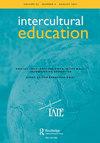In Other Words – a Contextualized Dictionary to Problematize Otherness: an online educational resource to challenge – and reverse – discriminatory language
IF 0.8
Q3 EDUCATION & EDUCATIONAL RESEARCH
引用次数: 0
Abstract
Accenteism, chakka, foreignness, gender, immigrant, muxe, propaganda, silence, tradition. What do these words have in common? They are all words that, in different contexts and in different countries, (re)produce different forms of Otherness. They are also some of the keywords analysed in the online dictionary In Other Words – a Contextualized Dictionary to Problematize Otherness (IOW), a free resource that critically discusses discriminating keywords and presents creative proposals taken from the arts, literature, music, street art, and videos, to provide counter illustrations capable to reverse predominant narratives of the Other. Many historical and contemporary examples show how words are used, manipulated, and mobilised to contribute to the construction of Otherness, creating specific narratives that have the power to shape individual and collective representations and interpretations of the self and others. IOW dictionary is a site to develop and share critical and intercultural awareness able to challenge the reification, the stigmatisation, the stereotyping, or the folklorisation of ‘the Other’ carried out through the dissemination of dehumanising language. By promoting reflections and collective discussions on discriminating language, IOW dictionary fosters intercultural dialogue and mutual understanding across diversities. The website is responsive, so IOW dictionary is a very accessible and user-friendly resource that can be used on different devices in various educational contexts, both formal and informal. Moreover, unlike a book that, at the end, has a final full stop, being online allows IOW dictionary to be a constant work in-progress, of being not so much a product, but rather an ongoing process always open to further collaborations and contributions. Indeed, we believe that raising critical awareness on discriminating language is just part of our work as intercultural educators. That’s why the creative subversion is a relevant step to engage directly students, teachers, activists, scholars, and artists as active participants. Therefore, we encourage the readers of Intercultural Education not only to use the dictionary for their practice and teaching but also换句话说,一个语境化的词典,以问题化他者:一个在线教育资源,挑战和扭转歧视性语言
口音,查卡,外族,性别,移民,穆斯,宣传,沉默,传统。这些词有什么共同之处?它们都是在不同的语境和不同的国家,(重新)产生不同形式的“他者”的词语。它们也是在线词典“in Other Words - a Contextualized dictionary to Problematize Otherness (IOW)”中分析的一些关键词,这是一个免费资源,批判性地讨论歧视性关键词,并提出来自艺术、文学、音乐、街头艺术和视频的创造性建议,以提供能够颠倒他者主流叙事的反插图。许多历史和当代的例子表明,文字是如何被使用、操纵和动员起来,为“他者”的构建做出贡献,创造出特定的叙事,这些叙事有能力塑造个人和集体对自我和他人的表述和解释。IOW词典是一个发展和分享批判性和跨文化意识的网站,能够挑战通过传播非人性化语言而实现的“他者”的物化、污名化、刻板印象或民俗化。通过促进对歧视性语言的反思和集体讨论,词典促进了跨文化对话和跨文化的相互理解。网站是响应性的,所以IOW词典是一个非常容易访问和用户友好的资源,可以在各种教育背景下的不同设备上使用,无论是正式的还是非正式的。此外,不像一本书,在最后,有一个最后的句号,在线允许IOW词典是一个不断进行的工作,不是一个产品,而是一个持续的过程,总是对进一步的合作和贡献开放。事实上,我们相信提高对歧视语言的批判意识只是我们作为跨文化教育者工作的一部分。这就是为什么创造性颠覆是直接吸引学生、教师、活动家、学者和艺术家作为积极参与者的相关步骤。因此,我们鼓励《跨文化教育》的读者不仅在实践和教学中使用词典,而且在实践和教学中使用词典
本文章由计算机程序翻译,如有差异,请以英文原文为准。
求助全文
约1分钟内获得全文
求助全文
来源期刊

Intercultural Education
EDUCATION & EDUCATIONAL RESEARCH-
CiteScore
2.30
自引率
8.30%
发文量
36
期刊介绍:
Intercultural Education is a global forum for the analysis of issues dealing with education in plural societies. It provides educational professionals with the knowledge and information that can assist them in contributing to the critical analysis and the implementation of intercultural education. Topics covered include: terminological issues, education and multicultural society today, intercultural communication, human rights and anti-racist education, pluralism and diversity in a democratic frame work, pluralism in post-communist and in post-colonial countries, migration and indigenous minority issues, refugee issues, language policy issues, curriculum and classroom organisation, and school development.
 求助内容:
求助内容: 应助结果提醒方式:
应助结果提醒方式:


